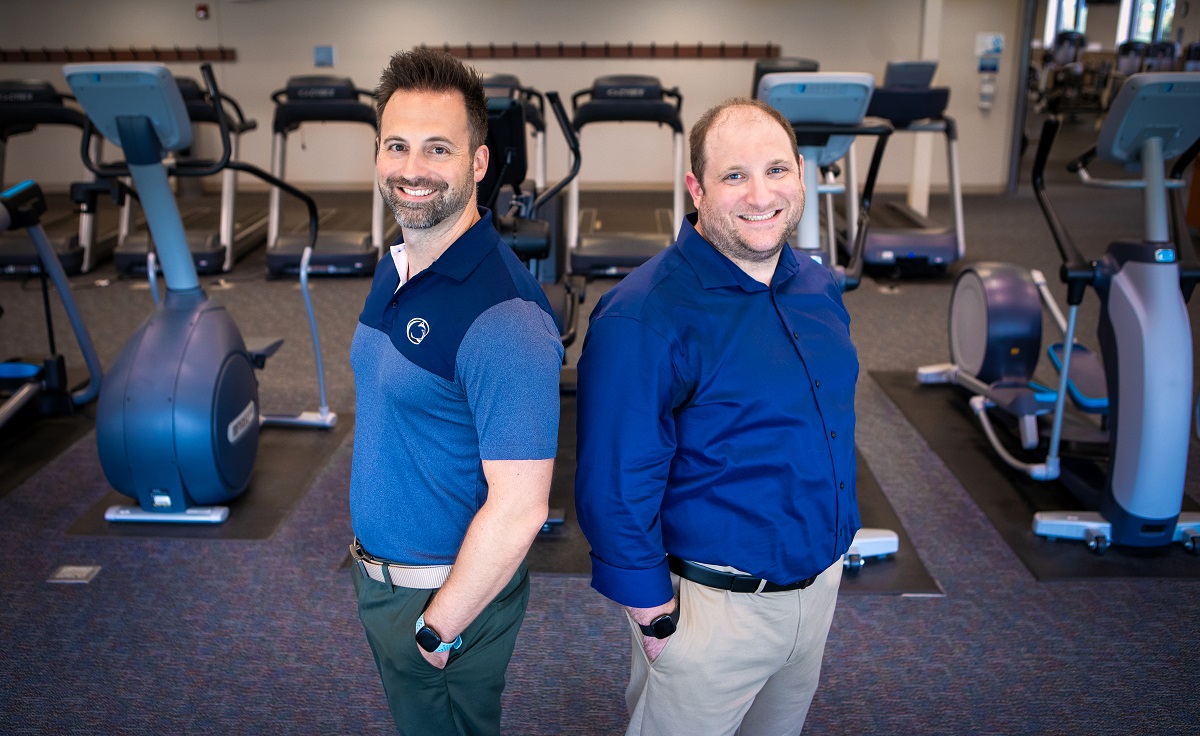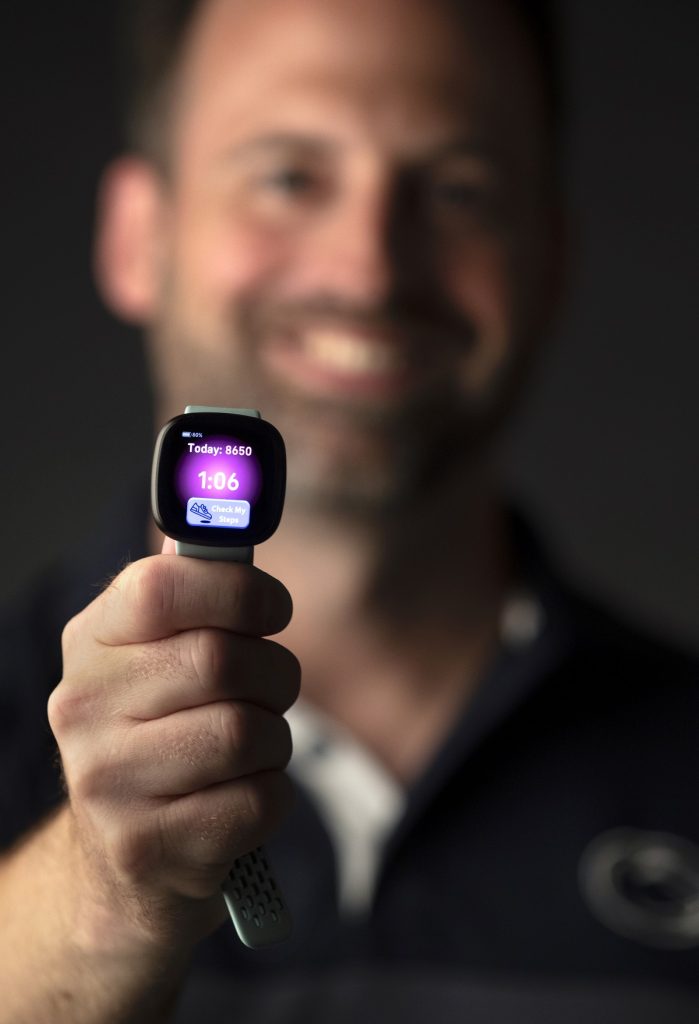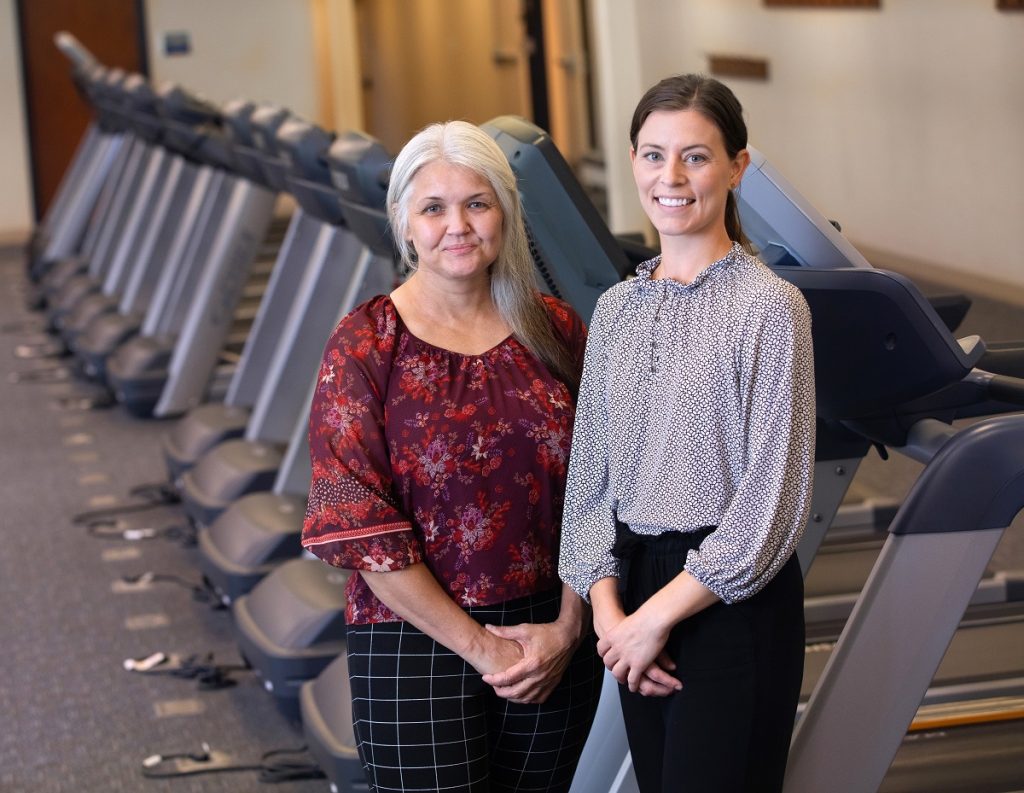College of Medicine researchers develop app to encourage long term physical activity, reduce Alzheimer’s risk

Penn State College of Medicine researchers are exploring a new way to keep people physically active long-term, and in doing so, they said they hope to prevent the development of Alzheimer’s disease and other neurodegenerative diseases. With a $3.6 million, two‑phase grant from the National Institute on Aging (NIA), the team will study whether training people to set and monitor their progress toward short-term, everyday physical activity goals encourages them to stay physically active long term.
According to Jonathan Hakun, PhD, assistant professor of neurology and lead researcher on the project, engaging in regular light intensity physical activity may have significant health benefits, including advantages for cognitive and brain health. While federal guidelines maintain that regular engagement in high intensity exercise is ideal for long-term health and disease prevention, light intensity physical activity may offer another avenue to positive health outcomes that may be more accessible to individuals transitioning into an active lifestyle.
“Step counting, which has become an almost universal feature of fitness and smart watches these days, is a very accessible method of tracking total physical activity levels,” Hakun said. “But, instead of just having the device keep track of our step counts each day, we’re hoping to use a ‘bite-sized’ goal setting approach to encourage people to learn how and when they might make steady progress toward health promoting levels of daily physical activity.”
Hakun hypothesizes that maintaining activity goals by setting small, achievable targets will not only help people achieve their day-to-day goals, but that it will lead to long‑term, positive health outcomes.
Embracing activity to prevent brain disease
One of the health outcomes researchers want to avoid is Alzheimer’s disease — a condition that more than six million Americans live with. Research shows that overweight and obese people are at increased risk for developing Alzheimer’s disease and related dementias, but getting and staying physically active in midlife may reduce the risk of developing dementia.
According to Hakun, researchers have conducted numerous lifestyle intervention clinical trials to improve cognitive and brain health, but one question still remains unanswered at the end of these trials — are people sticking with the new habits they’ve developed?
Hakun and his team will use wearable devices to deliver interventions designed to promote long‑term maintenance of light intensity physical activity in middle-aged adults at increased risk for Alzheimer’s disease and related dementias.

A College of Medicine-led research team custom programmed a clock face for the Fitbit Versa smart watch, which will set personalized goals for study participants after synthesizing information about a wearer’s daily physical activity.
They developed a custom clock face for the Fitbit Versa smart watch. While the clock face initially appears as just a time and battery level display, it synthesizes information about the wearer’s daily physical activity patterns. Over time, the clock face will leverage that information to set personalized goals using an algorithm developed by the team.
First, the clock face app will calibrate participant’s activity levels for a few weeks. Then, the clock face switches into a “training” mode where the daily step goal intervention begins. All participants will be offered adaptive, daily step goals and have the ability to self‑monitor their progress. But, one group will be randomly assigned to an experimental condition involving interim goal setting every few hours.
“What I love about this study is that everybody gets the ‘intervention’, which is a month-long, adaptive light intensity physical activity intervention,” Hakun said. “Everyone will have the opportunity to make a positive change in their health, and that’s really exciting.
Hakun said he believes these intermittent, short‑term goal prompts, known as ecological momentary interventions, will promote long-term adherence to physical activity.
“Ecological momentary interventions are a method of delivering intervention components over the course of a person’s everyday life,” Hakun said. “My hope is that these short-term goal prompts help the participants keep their activity goals active throughout the day and help them identify opportunities in their daily routines to make consistent progress.”
Participants will also start and end each day interacting with brief smart phone-based surveys and cognitive assessments developed by his team. Hakun said a primary aim of the research is to determine how aspects of cognition like short-term memory and attention affect the ability of participants to reach their goals.
After one month, Hakun and team will stop giving both groups of participants defined goals. They’ll follow up with participants at one month and one year after completion of the training phase to study differences in how the two groups fared in achieving their goals and whether the intervention had any influence on longer-term cognitive health.
Where data and programming meet psychological research
Hakun has been learning how to apply digital tools to study human behavior since joining Penn State in 2015. Through several National Institutes of Health grants, he immersed himself in the world of mobile assessment and intensive data collection, analysis and study design. He is working with project data scientist Daniel Elbich, PhD, to develop the Fitbit application data management code needed for the research.
Hakun and his team collected pilot data over the past year to see whether their study is feasible and how the technology performed live in the field with study volunteers. Phase two — the clinical study —will launch in early fall. Individuals interested in participating may learn more here.

Research coordinators Jennifer Coyl and Beth Kanski, will enroll and interact with participants in the study.
“This is the second two-stage award we’ve received from NIA over the past seven years,” Hakun said. “These funds and their developmental focus have been critical to my success. I’m excited to develop the knowledge and infrastructure needed to run a nuanced and technology-driven study like this, which could help reduce risk for neurodegenerative diseases. This project is a unique blend of data science, programming, psychological and clinical research.”
This project is the first dementia prevention trial funded since Penn State launched its interdisciplinary Geroscience and Dementia Prevention Consortium. The project will use several Penn State-developed technologies including the Mobile Monitoring of Cognitive Change (M2C2) platform. M2C2 was initially developed at the Center for Healthy Aging with support from the Penn State Social Science Research Institute and further developed in collaboration with the NIA. The M2C2 platform relies on data infrastructure provided by Penn State Cloud Services and the Survey Research Center. The study’s Fitbit clock face will also rely on and build upon this data infrastructure.
The project is a cross-campus collaboration involving researchers from the College of Medicine and University Park. Other Penn State researchers involved with the project include Christopher Sciamanna, Timothy Brick and Shouhao Zhou. Jessie Alwerdt and Ashley Tate of the Center for Healthy Aging will also contribute to this project. The researchers declare no conflicts of interest.
The National Institutes of Health (grant number R61/R33AG078084) supports this research. The views expressed are those of the researchers and do not necessarily represent the views of the NIH.
If you're having trouble accessing this content, or would like it in another format, please email Penn State Health Marketing & Communications.
